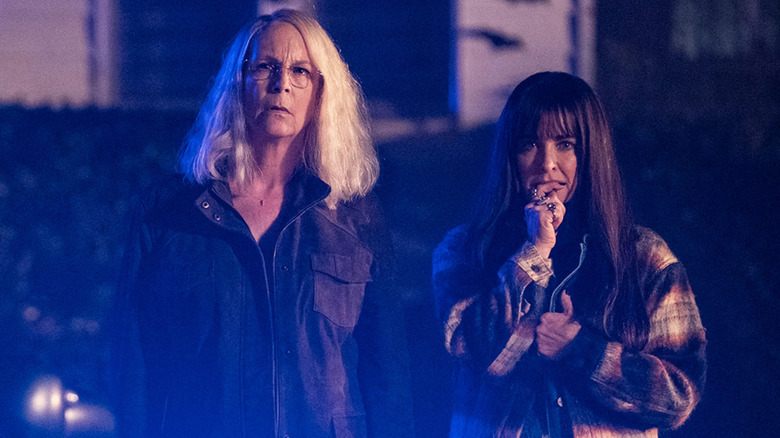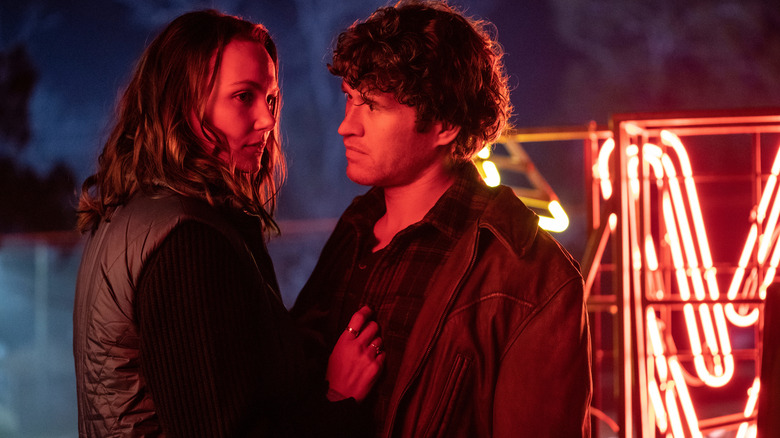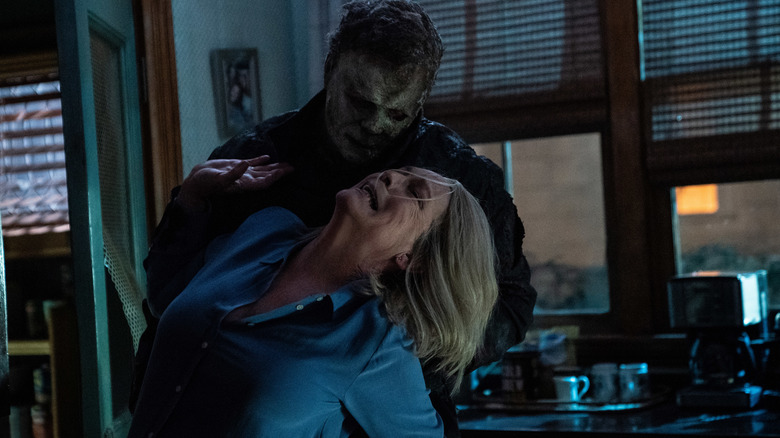Halloween Ends Review: Plot Coherence Dies Tonight
- It's good to see Laurie Strode and Michael Myers one last time
- The movie's lead is a new, uninteresting character
- The citizenry of Haddonfield is a serious bummer
- Michael Myers is barely in the movie
As the sun sets on (at least this latest iteration of) the "Halloween" franchise, film history seems likely to note that the most intriguing element David Gordon Green and Danny McBride attempted to harness was a desire to make Haddonfield into a real, tangible place filled with actual human beings. A small, Americana-aspiring burgh, it has long been home to Michael Myers and the bloodshed trail that follows behind him. But it wasn't until their eagerly-anticipated, John Carpenter-blessed, Jamie Lee Curtis-fronted new trilogy (2018's "Halloween," 2021's "Halloween Kills," and now 2022's "Halloween Ends") that the town felt like more than just a crime scene.
Their Haddonfield is a town of decades-long victimization, and its residents are determined to see themselves as survivors and not let the mask-wearing maniac of their past define them. Unfortunately, this has resulted in a town like those seen in "Village of the Damned" or Atom Egoyan's "The Sweet Hereafter": Generational distress has led to a blanketing misery that yields broken residents whose fleeting moments of joy are accompanied by an immense sense of guilt. Although these people are going through the motions, there is little hope for any future.
With "Ends," Green and McBride find themselves painted into a corner of their own doing, trying to extract themselves by making all these morose characters feel profound. Can you choose joy? Can you block out evil? If death is coming for you, can you simply turn a blind eye?
Whatever these answers may be (and the film has no interest in seriously exploring them), the fact remains that we, the viewers, are left with a Haddonfield where everyone is miserable, every resident is like a slaughterhouse animal waiting to be put out of their misery, and leading them all is Laurie — who inexplicably has now chosen to give up her recent survivalist proclivities and instead move into the most annoyingly cheerful house in Haddonfield, a metaphor for embracing a full-throated joie de vivre as she writes some sort of autobiography that seems to have five different dramatically-typed final sentences.
Play Michael for me
"There are two kinds of evil," the iconic Curtis character says in one of many speeches (to a murderer, who sits there intently and takes it all in) emblematic of her apparent new mindset as Haddonfield's Dr. Phil. "There's the evil that exists as an external force, that threatens the wellbeing of the tribe. Survival depends on understanding and awareness and fear of physical threats to our daily lives. The other kind of evil lives inside us, like a sickness or an infection. It's more dangerous, because we may not know we're infected."
Unfortunately, after the initial burst of energy surrounding these Green/McBride films (and some inspired moments in "Halloween Kills"), a simmering infection seems to have finally struck with "Ends." It has manifested itself in absurd scenes where band kids bully random people in gas station parking lots, antagonistic, Nietzsche-quoting DJs pick fights outside their studio (hopefully playing "Bohemian Rhapsody" or something else that will permit enough time), and an entire town is populated by people hiding behind things, looking at other people.
These Haddonfield residents are big fans of killing each other with little to no provocation, urging "Do it!" while others try to murder them, and having people walk in on them while holding knives over dead bodies at inopportune moments. Haddonfield is undoubtedly the "creepily, unknowingly staring at someone else" capital of Illinois. The board of tourism might want to put that on the city's signage.
Into this morose backdrop is placed Corey (Rohan Campbell), a once-promising student who accidentally kills a child in the opening moments of "Ends." When the film picks up, three years after that tragedy and four after anyone has seen Michael, Corey is going down a dark road that makes him want to be the new Michael Myers — and simultaneously, find love in Laurie's granddaughter Allyson (Andi Matichak), who seems totally cool with all this. Examine the poster and trailers all you want, but make no mistake: Corey is the main character of this film. And it's a bold choice by director Green to cast the most lifeless, uninteresting actor in the whole film to play this lead role.
If you're thrilled at the thought of moments where Laurie's granddaughter lovingly coos "just burn it all to the ground," and the new Michael Myers (initially wearing a mask that makes him look like Raggedy Andy) whispers back "I'll light the match," you're in for a treat. Because "Ends" is as much a low-rent "Natural Born Killers" as it is a "Halloween" movie.
For most of the film, Michael Myers has less screen time than Judi Dench in "Shakespeare in Love." Those famous Carpenter music cues are essentially nonexistent — although characters keep randomly plinking keys on a piano, creating a hope that somebody will just bang out the familiar notes. The end credits do give fans "Don't Fear the Reaper," and there are certainly lots of times when people sit up creepily or tilt their heads — but you might as well fast-forward to the final few minutes, which contain the inevitable Michael/Laurie smackdown, because everything else is a miserable slog, largely rendered irrelevant in the final act by Corey's comeuppance and Laurie's reversion to her old ways.
Could I have this dance for the rest of my life?
A lot of "Halloween Ends" will have you hitting the "back 10 seconds" button on your Peacock app to make sure you heard what you think you heard. Did Corey just drop an "I killed someone" on Allyson during their date, and then before we see her response — the film cuts to more date? Is fake Michael Myers hanging out with real Michael Myers, uttering things like "Show me how to do it"?
As far as mentors go, non-verbal guys with masks concealing their facial expressions are a pretty lousy choice — does Michael even want a successor? By not immediately killing Corey, does he approve? — nonetheless, this is a film about Corey's serial killer internship. He might not get course credit, but he does get to chill in the cool drainage ditch where Michael has apparently been hiding for the last four years. Perks include an endless supply of knives, cool jumpsuits, and he gets to bring his girlfriend (who seems more turned on by each new facial wound) to work.
In one particularly weird scene, Corey (who keeps getting his butt kicked by others throughout most of the film) walks up to Michael Myers, overpowers him, and pulls off his mask in a matter of seconds. So essentially, this guy can do what 12 movies' worth of victims (at last count, 92 people) cannot. Like so much of "Ends," when the plot requires something to happen it happens — regardless if it holds any truth for the characters.
You would at least think, as the script just isn't working, someone as smart and funny as McBride would just say "to heck with it" and lean into the potential camp of the situation. Allyson texts Corey in one scene to see how he's doing — but at that point, her paramour has donned the mask and is slaughtering half the town. If nothing else, give us the surreal visual of Michael Myers checking his cell phone, maybe updating his social media with a stabby selfie. Or when Corey shows up in Michael Myers coveralls — after deciding to become a serial killer, did he go pick them up at Walmart? Did Michael take him shopping? Or perhaps, did the Boogeyman loan him an old pair of his that he had left in the dryer too long, causing them to shrink?
The end of "Ends" is nothing worth remembering. No great send-off for Laurie, just a cultish moment of peculiar "healing" for Haddonfield — which, for a small town, seems to have a lot of radio and TV stations dedicated to its citizenry. After three movies and all these hours of set-up, that's the best ending they could come up with? Make no mistake, Michael Myers found himself in a deep rut in the early '90s, and Rob Zombie certainly did the character no favors either. But after this flaccid trilogy, perhaps it's finally time to join Freddy in the old slashers' retirement home.


